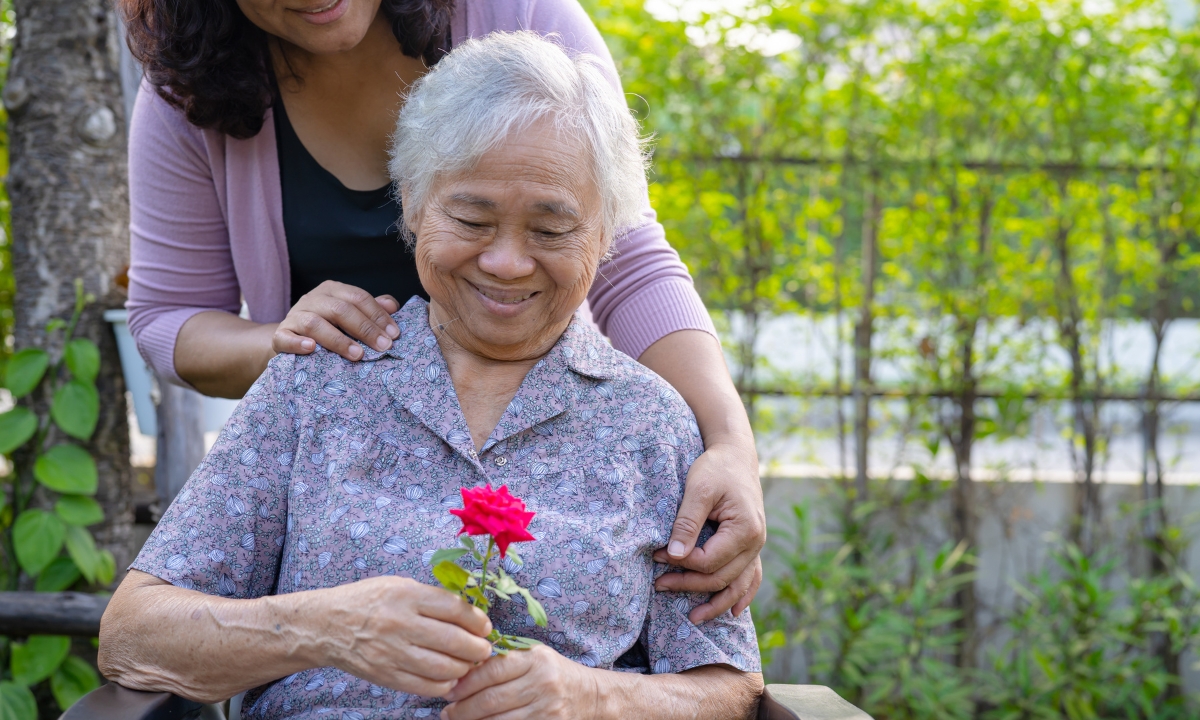If you’re caring for a loved one with dementia, you may have noticed that their symptoms become more pronounced or challenging in the late afternoon or early evening. This phenomenon, known as Sundowners Syndrome or sundowning, is a common and often distressing aspect of dementia. It can cause confusion, agitation, anxiety, and behavioral changes, making it difficult for your loved one to wind down at the end of the day.
At Reliant Home Care Services, we understand how overwhelming sundowning can be for families. With the right strategies and support, you can help your loved one manage these symptoms while promoting their safety and comfort. Let’s take a look at what sundowning is, discuss practical tips for caring for your loved one, and explore how in-home care in Riverside County, including Murrieta, Temecula, and Menifee, can make a difference.

What is Sundowners Syndrome?
Sundowners Syndrome is a term used to describe the worsening of dementia symptoms later in the day. It affects people with Alzheimer’s disease and other forms of dementia and can manifest in various ways, including:
- Increased confusion and disorientation
- Restlessness or pacing
- Irritability or mood swings
- Difficulty sleeping or increased wakefulness
- Aggression or frustration
While the exact cause of sundowning isn’t fully understood, some contributing factors may include fatigue, changes in light, or disruptions to the body’s internal clock.
According to the Alzheimer’s Association, 20% of individuals with Alzheimer’s disease experience sundowning. For caregivers, this time of day can be especially challenging, as it often coincides with their own feelings of exhaustion from managing care throughout the day.
Tips for Managing Sundowners Syndrome
Managing sundowning requires patience, understanding, and the ability to adapt to your loved one’s needs. Here are some tips to help you navigate this unique dementia challenge:
1. Create a Consistent Routine
Consistency is key when caring for someone with dementia. Establishing a regular daily schedule can help reduce anxiety and confusion. Plan stimulating activities earlier in the day and create a calming evening routine to signal that it’s time to wind down.
2. Optimize Lighting in the Home
As the sun sets, shadows and dim lighting can increase confusion or fear for individuals with dementia. Ensure your loved one’s living space is well-lit, especially in the late afternoon and early evening. Use soft, warm lighting to create a calming atmosphere and minimize harsh shadows.
3. Encourage Physical Activity
Engaging your loved one in gentle physical activity during the day can help reduce restlessness and promote better sleep at night. A short walk, light stretching, or seated exercises are excellent options to keep them active without overexertion.
4. Minimize Stimulation in the Evening
Too much noise or activity in the evening can contribute to agitation and confusion. Create a calm environment by turning off the television, limiting visitors, and using soothing music or sounds to help your loved one relax.
5. Monitor Their Diet
What your loved one eats and drinks can impact their symptoms. Avoid caffeine and sugar in the afternoon and evening, as these can contribute to restlessness. Offer a light, balanced dinner and ensure they stay hydrated throughout the day.
6. Offer Reassurance and Comfort
When your loved one experiences sundowning symptoms, they may feel scared or frustrated. Offer reassurance through gentle words, a calming touch, or familiar objects like a favorite blanket or photo. Remember, your presence can be a source of comfort.
How In-Home Care Can Help with Sundowning
Managing sundowning can be physically and emotionally draining for family caregivers. In-home care provides much-needed support, helping your loved one stay safe and comfortable while promoting independent living.
At Reliant, we offer compassionate and experienced caregivers who understand the challenges of sundowning. Here’s how in-home care in Murrieta can make a difference:
1. Personalized Care Plans
Our caregivers work with you to develop a tailored care plan that meets your loved one’s unique needs. From creating a calming evening routine to assisting with daily activities, we provide individualized support.
2. Safety and Fall Prevention
Sundowning can increase the risk of wandering or falls. Our caregivers ensure your loved one’s safety by providing supervision, mobility assistance, and a secure environment.
3. Emotional and Social Support
Sundowning can be an isolating experience for individuals with dementia. Caregivers offer companionship and reassurance, helping your loved one feel understood and valued.
4. Respite for Family Caregivers
Caring for a loved one with dementia is a full-time responsibility. In-home care gives you the opportunity to rest and recharge, knowing your loved one is in capable hands.

Promoting Independent Living in Riverside County
With the right support, your loved one can continue living independently in their own home while managing sundowning symptoms. Familiar surroundings and routines are often comforting for individuals with dementia, making in-home care an ideal solution.
Reliant proudly serves families in Temecula, Menifee, and the surrounding areas by providing compassionate care that enhances quality of life. Our experienced team is here to support your family every step of the way, ensuring your loved one receives the care and attention they deserve.
Learn More About How Reliant Can Help
Sundowning presents unique challenges for families caring for loved ones with dementia, but you don’t have to face them alone. With patience, understanding, and the right care plan, you can help your loved one navigate this difficult time of day.
At Reliant Home Care Services, we are dedicated to providing the support your family needs. If you’re seeking in-home care in Riverside County, contact us today for a free consultation. Together, we can create a care plan that promotes safety, comfort, and independent living for your loved one. Let us help you find peace of mind and provide the compassionate care your family deserves.

